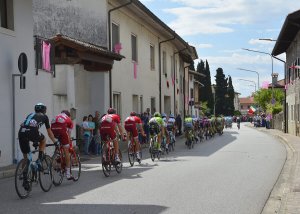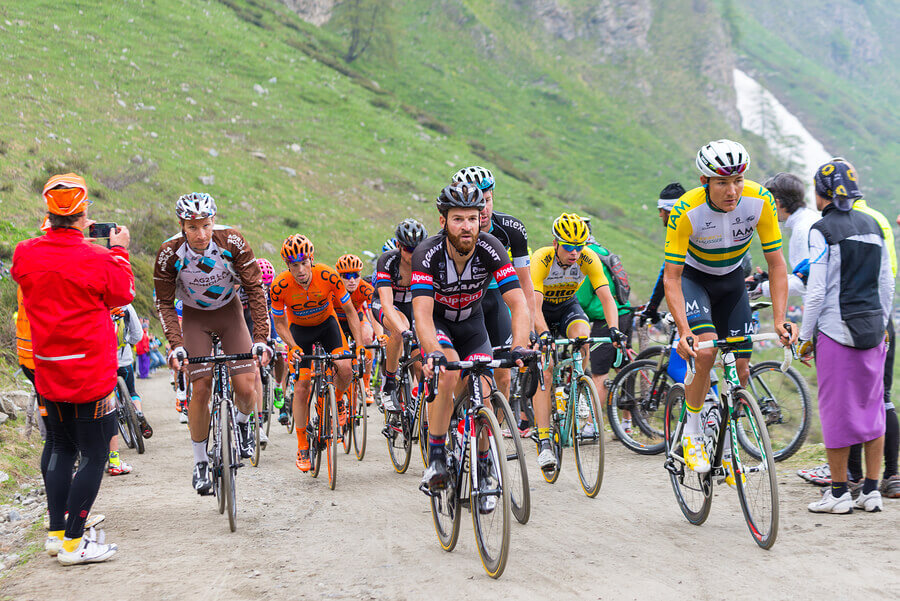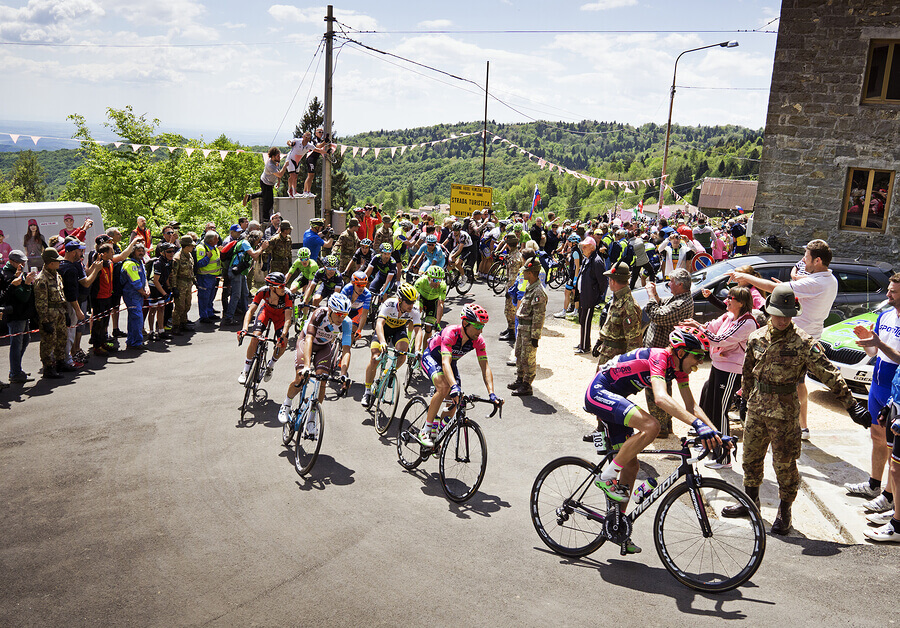Giro d'Italia: One of the Most Important Cycling Tours

Together with the Tour de France and Vuelta España, the Giro d’Italia forms part of the three major cycling competitions. Want to know more about this international competition? Keep reading today’s post!
History of the Giro d’Italia
Just as in the case of the Tour de France, the Giro d’Italia first started thanks to the efforts of a sports publication. La Gazzetta Dello Sport organized the cycling event in response to Corriere Della Sera’s– a different sports newspaper– Giro d’Italia Automobilistico.
The first edition of the Giro d’Italia took place in May 1909 with 127 participants, eight stages and nearly 2,500 kilometers. Italian cyclist Luigi Ganna won the tour.
The next editions featured several changes regarding the number of stages, point-system and start- and finish-spots. The First and Second World War brought the race to a halt during 1915-1918 and 1941-1945. Since 1946, the Giro d’Italia has come back every year; in 2019, the cyclists participated in the 102nd edition.
In 1931, officials added symbols to the big tours to better characterize them: a special jersey to identify the leaders of the general classification. The color pink was chosen as a nod to the colors of the pages that La Gazzetta printed their stories on. The first cyclist to don the pink jersey was Learco Guerra, who won the Milan-Mantova stage that year.
In the first decades of mostly, Italian-competition saw its first threat from eager foreign cyclists. For example, there was Charly Gaul from Luxembourg and Jacques Anquetil from France (who won the Tour de France five times).

The 70s unquestionably laid in the palm of Belgium Eddy Merckx’s hand. He won all the seven races that he participated in. But the Giro went back to the Italians in the 80s, caught in the rivalry between Giuseppe Saronni and Francesco Moser.
Later in the 90s, Italian cyclists such as Gianni Giugno, Claudio Chiapucci, and Franco Chioccoli kept the local dominance alive.
The kit
The current shirts are pink for the general classification leader and blue (since 2012 and before this, green) for the mountain classification leader. There’s also a purple shirt for the point classification leader and a white shirt for the youth rider classification leader.
The Giro d’Italia also has minor classifications. However, the minors don’t use special colors due to the Union Cycliste Internationale (UCI) rules.
The minor classifications include team events, sprints, fair play, and combativity classifications.
The most recent Giro d’Italia
Edition 102 took place between May 11 and June 2 in 2019. It started in Bologna with an individual time trial and ended with the same event in Verona.
The 2019 Giro d’Italia had a total of 21 stages and nearly 3,500-kilometer-long distance. Ecuadorean Richard Carapaz won the general classifications and second went to Italian Vincenzo Nibali.
The point classification went to German, Pascal Ackerman while Italian, Giulio Ciccone won the mountain classification. Lastly, the youth rider classification went to Colombian, Miguel Ángel.
The race took the riders to the following locations:
- Sanctuary of Madonna di San Luca
- Fucecchio
- Vinci
- Orbetello
- Frascati
- Terracina
- Cassino
- San Giovanni Rotondo
- Vasto
- L’aquila

- Tortoreto
- Pésaro
- Riccione
- Rávena
- Módena
- Carpi
- Novi Ligure
- Cuneo
- Pinerolo
- Ceresole Reale
- Saint-Vincent
- Courmayeur, Ivrea
- Como
- Lovere
- Ponte di Legno
- Comezzadura
- Rasun Anterselva
- Valdaora
- Santa María di Sala
- Treviso
- San Martino di Castrozza
- Feltre
- Cocre d’aune
To wrap up our post, we want to mention that the race also included a stage in San Marino, which paid homage to several important figures. One of which was dedicated to Leonardo da Vinci, on the 500th anniversary of this death; the other was to rider Fausto Coppi, who became a legend in the 1949 Giro.
Together with the Tour de France and Vuelta España, the Giro d’Italia forms part of the three major cycling competitions. Want to know more about this international competition? Keep reading today’s post!
History of the Giro d’Italia
Just as in the case of the Tour de France, the Giro d’Italia first started thanks to the efforts of a sports publication. La Gazzetta Dello Sport organized the cycling event in response to Corriere Della Sera’s– a different sports newspaper– Giro d’Italia Automobilistico.
The first edition of the Giro d’Italia took place in May 1909 with 127 participants, eight stages and nearly 2,500 kilometers. Italian cyclist Luigi Ganna won the tour.
The next editions featured several changes regarding the number of stages, point-system and start- and finish-spots. The First and Second World War brought the race to a halt during 1915-1918 and 1941-1945. Since 1946, the Giro d’Italia has come back every year; in 2019, the cyclists participated in the 102nd edition.
In 1931, officials added symbols to the big tours to better characterize them: a special jersey to identify the leaders of the general classification. The color pink was chosen as a nod to the colors of the pages that La Gazzetta printed their stories on. The first cyclist to don the pink jersey was Learco Guerra, who won the Milan-Mantova stage that year.
In the first decades of mostly, Italian-competition saw its first threat from eager foreign cyclists. For example, there was Charly Gaul from Luxembourg and Jacques Anquetil from France (who won the Tour de France five times).

The 70s unquestionably laid in the palm of Belgium Eddy Merckx’s hand. He won all the seven races that he participated in. But the Giro went back to the Italians in the 80s, caught in the rivalry between Giuseppe Saronni and Francesco Moser.
Later in the 90s, Italian cyclists such as Gianni Giugno, Claudio Chiapucci, and Franco Chioccoli kept the local dominance alive.
The kit
The current shirts are pink for the general classification leader and blue (since 2012 and before this, green) for the mountain classification leader. There’s also a purple shirt for the point classification leader and a white shirt for the youth rider classification leader.
The Giro d’Italia also has minor classifications. However, the minors don’t use special colors due to the Union Cycliste Internationale (UCI) rules.
The minor classifications include team events, sprints, fair play, and combativity classifications.
The most recent Giro d’Italia
Edition 102 took place between May 11 and June 2 in 2019. It started in Bologna with an individual time trial and ended with the same event in Verona.
The 2019 Giro d’Italia had a total of 21 stages and nearly 3,500-kilometer-long distance. Ecuadorean Richard Carapaz won the general classifications and second went to Italian Vincenzo Nibali.
The point classification went to German, Pascal Ackerman while Italian, Giulio Ciccone won the mountain classification. Lastly, the youth rider classification went to Colombian, Miguel Ángel.
The race took the riders to the following locations:
- Sanctuary of Madonna di San Luca
- Fucecchio
- Vinci
- Orbetello
- Frascati
- Terracina
- Cassino
- San Giovanni Rotondo
- Vasto
- L’aquila

- Tortoreto
- Pésaro
- Riccione
- Rávena
- Módena
- Carpi
- Novi Ligure
- Cuneo
- Pinerolo
- Ceresole Reale
- Saint-Vincent
- Courmayeur, Ivrea
- Como
- Lovere
- Ponte di Legno
- Comezzadura
- Rasun Anterselva
- Valdaora
- Santa María di Sala
- Treviso
- San Martino di Castrozza
- Feltre
- Cocre d’aune
To wrap up our post, we want to mention that the race also included a stage in San Marino, which paid homage to several important figures. One of which was dedicated to Leonardo da Vinci, on the 500th anniversary of this death; the other was to rider Fausto Coppi, who became a legend in the 1949 Giro.
All cited sources were thoroughly reviewed by our team to ensure their quality, reliability, currency, and validity. The bibliography of this article was considered reliable and of academic or scientific accuracy.
- Carreño, M. Recorrido, etapas y perfiles del Giro de Italia 2019. Marca. Mayo de 2019. https://www.marca.com/ciclismo/giro-italia/2019/05/10/5cd59bd7268e3e76128b4584.html
- Diario As. Las etapas claves que pueden decidir el Giro de Italia 2020. Octubre de 2019. https://as.com/ciclismo/2019/10/25/giro_italia/1572012809_284271.html
This text is provided for informational purposes only and does not replace consultation with a professional. If in doubt, consult your specialist.








